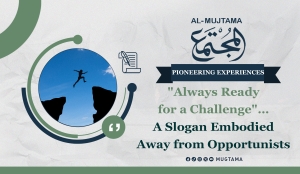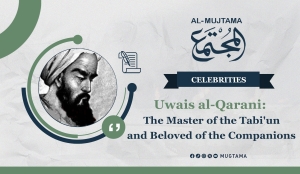"Always Ready for a Challenge"… A Slogan Embodied Away from Opportunists
February 15, 2025For years, the phrase "Always Ready for a Challenge," which is the title of a song, has been adopted by self-proclaimed "feminists" as a slogan. They use it to promote female figures they wish to present as societal icons, aiming to distort our Arab and Islamic identity.
This happens despite the contradictions in what these figures promote—often rejecting our values and beliefs, and advocating ideas that increase societal polarization and waste the community’s energy on futile battles, or at best, battles that are not a priority compared to the fundamental struggles of the ummah on its path to revival.
Today, however, we raise this slogan for a woman who truly deserves recognition and can serve as a role model for our daughters.
The woman I am referring to is an Arab Jordanian lady. If it were up to me, I would make her life story and stances part of the school curriculum for our sons and daughters, so they can learn about real role models, away from those imposed upon them for dubious purposes.
I am talking about Dr. Rima Khalaf. After graduating from the American University of Beirut and obtaining higher studies in economics from Western universities, she returned to her homeland, Jordan, where she held several ministerial positions before embarking on a journey in various roles within United Nations organizations.
Among the positions she held were Assistant Secretary-General of the United Nations and Regional Director of the United Nations Development Programme (UNDP) from 2000 to 2006. While in this role, she launched projects to promote good governance, human rights, and human development in Arab countries.
During this period, she played a prominent role in publishing a periodic report on human development in the Arab world, which garnered significant attention and appreciation in Arab intellectual circles.
In 2005, the Arab League honored her at its headquarters in Cairo. On the sidelines of that visit, the Egyptian Doctors Syndicate hosted her at the "House of Wisdom" (Dar Al-Hekma), where she was celebrated as an Arab pioneer who held prestigious international positions.
I still remember her speech in which she confidently predicted the inevitable downfall of oppressive regimes and the inevitability of peoples enjoying their full rights and freedoms, citing the collapse of the Soviet Union and the end of apartheid in South Africa as examples.
Later, I lost track of Khalaf’s activities due to my own negligence until one day in 2017, when I woke up to the news of her resignation from her position as Executive Secretary of the United Nations Economic and Social Commission for Western Asia (ESCWA) following the withdrawal of an international report accusing "Israel" of oppressing the Palestinian people.
After completing her report, which concluded that the "Israeli" occupation regime is an apartheid system and that the only solution to the Palestinian cause lies in dismantling this racist system, she recommended reinstating the anti-apartheid committees within the United Nations to take on this mission, just as was done with apartheid in South Africa.
The withdrawal of Khalaf’s report was not surprising to her, as she noted in her resignation letter to the UN Secretary-General. She was well aware of the direct and indirect influence that "Israel" enjoys through the U.S. Thus, she decided to resign, knowing from her extensive experience that maintaining her authority and holding high positions within the UN would only be possible with the approval of the Zionist-American axis. Yet she chose to stand by the truth.
I write these words today with the resources available to me to ensure that this lady’s stance is not forgotten, and that her example remains visible amid the spotlight given to actresses and socialites who are replicas of values and stances foreign to our ummah, presented as role models.
Rima Khalaf should not only serve as an example and role model for our daughters but for everyone—men and women—who truly belongs to this ummah.
Khalaf set an example for us all when she boldly spoke the truth, proving that it is possible to stand for what is right at any time and place, provided one listens to and obeys their conscience.
At the same time, Khalaf exposed the false slogans of feminism, which seek to undermine everything beautiful in our heritage and drive women away from the path Allah created for them—a path through which they can contribute significantly to their religion, their nation, and their homeland.
-------------------------------------------------------------
Uwais al-Qarani: The Master of the Tabi'un and Beloved of the Companions
December 12, 2024In the pages of Islamic history, unique figures emerge whose fame transcended the earth to reach the heavens. Among these luminous personalities is Uwais ibn Amir al-Qarani, a man who led a life of simplicity and devotion, far from the limelight, yet earned the Prophet's ﷺ mention, who described him as the best of the Tabi'un (successors). Known for his sincerity in worship, asceticism, and profound devotion to his mother, Uwais became a model of piety and obedience.
His Lineage and Status
Uwais ibn Amir al-Qarani hailed from the Yemeni tribe of Murad. Though he lived during the time of the Prophet ﷺ, he never met him because of his commitment to serving his mother, exemplifying filial piety and devotion. The Prophet ﷺ foretold his virtue and described him as the best of the Tabi'un, saying: "The best one of the next generation (At-Tabi'un) is a man called Uwais ibn Amir" (Narrated by Muslim). Despite his simplicity and humility, Uwais was an embodiment of asceticism and piety, devoting himself to Allah’s worship. His dedication to his mother was so profound that it prevented him from traveling to meet the Prophet ﷺ. This act of obedience elevated his status before Allah, granting him a special rank, with his prayers often answered due to his mother’s supplications for him.
His Worship and Contemplation
Uwais was known for his abundant worship and deep reflection. He spent much of his time in prostration and bowing, contemplating the magnificence of Allah's creation. His frequent tears out of the fear of Allah reflected his spiritual state. Despite his ascetic lifestyle and simple living, Uwais was not oblivious to the suffering of others; he carried the concerns of the hungry and needy in his heart. One of his sayings, which demonstrates his humility and sense of responsibility, was: "O Allah, I apologize to You for every hungry soul and bare body, and I possess nothing but what covers my back and fills my stomach."
Uwais embodied an unparalleled asceticism, choosing a life of austerity and simplicity, avoiding worldly adornments and ambitions for wealth or status. He viewed the worldly life as a fleeting journey toward the hereafter. When he met Umar ibn al-Khattab, he expressed his deep philosophy of asceticism by saying: "Before me is a steep incline that only the light and unburdened can cross." For Uwais, life was a passage requiring detachment from distractions, allowing focus on worship and self-purification, preparing for the Day of Meeting with Allah.
The Prophet's ﷺ Description of Him
The Prophet ﷺ described Uwais ibn Amir al-Qarani in precise terms that highlighted his unique physical and spiritual qualities. He said Uwais had bluish-gray eyes, broad shoulders indicating physical strength, and a dark complexion. Despite his humble appearance and simple attire, his heart was full of faith and piety. Uwais suffered from leprosy but earnestly supplicated to Allah, who healed him, leaving only a small spot the size of a coin as a reminder of Allah's mercy and power. The Prophet ﷺ said of him: "He is unknown among the people of the earth but well-known among the inhabitants of the heavens. If he swore by Allah, Allah would fulfill it. If you can ask him to seek forgiveness for you, then do so." This underscored his immense stature with Allah and his sincerity in faith, which made his supplications readily accepted.
His Meeting with the Companions
When delegations from Yemen arrived, Umar ibn al-Khattab would inquire: "Are you Uwais b., Amir? He said: Yes. He said: Are you from the tribe of Qaran? He said: Yes. He (Hadrat) 'Umar (again) said: Did you suffer from leprosy and then you were cured from it but for the space of a dirham? He said: Yes. He ('Umar) said: Is your mother (living)? He said: Yes. He ('Umar) said: I heard Messenger of Allah ﷺ say: There would come to you Uwais b. Amir with the reinforcement from the people of Yemen. (He would be) from Qaran, (the branch) of Murid. He had been suffering from leprosy from which he was cured but for a spot of a dirham. His treatment with his mother would have been excellent. If he were to take an oath in the name of Allah, He would honour that. And if it is possible for you, then do ask him to beg forgiveness for you (from your Lord). So he (Uwais) begged forgiveness for him.” (Narrated by Muslim)
Uwais held a significant status among the Companions due to the Prophet's ﷺ recommendation to seek him out and request his supplications. The Prophet ﷺ specifically advised Umar ibn al-Khattab and Ali ibn Abi Talib, may Allah be pleased with them, to do so, praising Uwais's standing and his answered prayers. During the Hajj season, Umar, may Allah be pleased with him, resolved to fulfill the Prophet's ﷺ directive. He searched for Uwais among the pilgrims until he found him tending to camels. Approaching him humbly, Umar introduced himself and then requested his supplication, saying, "I heard the Messenger of Allah saying: Worthy amongst the successors would be a person who would be called Uwais." This encounter highlighted the immense respect Uwais received from the Companions, despite his humility and preference for obscurity. Their hearts were filled with love for those whom the Prophet ﷺ had uniquely mentioned.
His Death
Uwais concluded his life of worship and devotion as a martyr in the Battle of Siffin in 37 AH. He fought on the side of Ali ibn Abi Talib, defending justice and truth with unparalleled courage. He sustained over forty wounds in the battle and was buried in the region of Raqqa, Syria. His memory remains alive in the annals of Islamic history and the hearts of Muslims, a fragrant legacy of piety and devotion.




